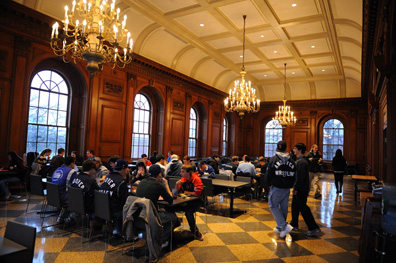
ANDOVER, Mass. — Phillips Academy, a residential secondary school, earned LEED Silver certification for the renovation of its 80-year-old dining hall, Paresky Commons.
Renovated over the course of 15 months, the Academy reused and recycled more than 90 percent of all construction debris and installed several energy-saving devices.
The dining hall’s food waste pulper-extractor system dehydrated and compacted more than 97 tons of organic matter for composting last year, which school officials say led to a 47 percent decrease in the academy’s incinerated waste in the last three years.
Paresky commons, which reopened in 2009, is the largest single energy consumer on campus, serving an average of 3,300 meals per day to approximately 1,100 students, 225 faculty and family members and 350 staff, according to the academy.
Further renovations of the 42,480-square-foot facility include a hood exhaust system that consumes roughly 50 percent less energy than conventional models, and new water and energy saving equipment, including enhanced electrical systems and high-efficiency insulation.
The cafeteria also implemented a number of operational changes to reduce its carbon footprint, according Paul Robarge, Paresky senior food services director.
The use of “trayless” dining resulted in a 100-lbs.-per-day reduction in food waste, as well as a significant reduction in water use.
Aggressive compacting and recycling of all cardboard, paper and plastic products, resulted in an about 1,000 pounds of cardboard alone being recycled each week, the school reports.
The dining hall also recycled all vegetable oil, 100 percnet compostable dishes when china or melamine is not an option, and only environmentally friendly cleaning products.
The cafeteria’s menu also aims to use locally grown, hormone free and certified organic foods.
